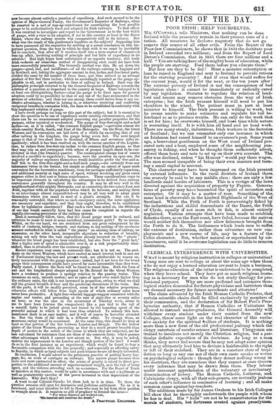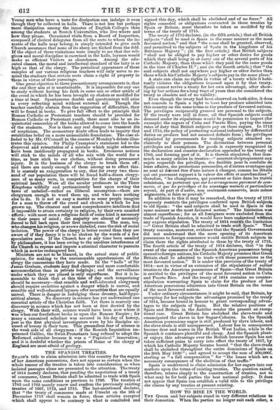CLERICAL INTERFERENCE WITH UNIVERSITIES. WHAT is meant by religious instruction
in colleges or universities?, Young men are sent to college at about the same age when those who do not enjoy a learned education are sent to learn a business.. The religious education of the latter is understood to be completed, when they leave school. They have got as much religious.learn, ing as is necessary for men who do not study theology for pro.- fessional purposes. Why are more profound and extensive theo. logical studies demanded for future physicians and barristers than,: are deemed necessary for future merchants and attornies ? The claim advanced by the Irish Roman Catholic Prelates, that, certain scientific chairs shall be filled exclusively by members of their communion, and the declaration of Sir Robert Peel's Pres-, byytteerian authority, that if Roman Catholics or Unitarians be allowed to instruct under-graduates, the General Assembly will withdraw every student under their control from the new Colleges, throw some light on the real character of this exclu-. sive anxiety for the spiritual Welfare of students. It is nothing. more than a new form of the old professional jealousy which the clergy entertain of secular science and literature. Clergymen aze, trained to inculcate not merely the Christian religion, but a par.. titular definite exposition of its doctrines. As long as a maig thinks, they never feel secure that he may not adopt some opinion that may ultimately lead him to deviate a hairbreadth to the right or left of their standard. They are in a. constant state of trepi- dation so long as any one not of their own caste speaks or writes on psychological subjects : though they detect nothing wrong in: his doctrines, they are conscious that they cannot at once discern, every inference that may be drawn from them. They labour under incessant apprehension of the voluntary or involuntary dissemination of heresy. The Roman Catholic, Lutheran, and Calvinistic clergy, with all their sub-genera, are mutually jealous. of each other's influence in seminaries of learning ; and all make common cause against lay-teachers.
The additions made by Sir James Graham to his Irish College* bill show that he thoroughly understands the people with whom he has to deal. His " halls' are not to be conservatories for the morals of students, but fortresses erected against proselytism. Young men who have a taste for dissipation can indulge it even though they be collected in halls. There is not less but perhaps more dissipation among the inmates of English Colleges than among the students at Scotch Universities, who live where and how they please. Occasional visits from a Board of Inspection, composed of clerical delegates from all the sects to whom the in- mates of the halls may belong, is simply intended to give each Church assurance that none of its sheep are filched from the fold. If the object of these visitations were simply to see that due reli- gious and moral discipline is exercised in the halls, laymen would make as efficient Visiters as churchmen. Among the edu- cated classes, the moral and intellectual standard of the laity is as high as that of the clergy. The periodical appearance of these samples of our various religious teachers will only serve to re- mind the students that certain sects claim a right of property in 'them in virtue of their parentage.
One great objection to these precautionary arrangements is, that the end they aim at is unattainable. It is impossible for any one 'to study without having his faith in some one or other article of the creed in which he has been brought up shaken or modified for a time at least. Spontaneous doubts and questionings will arise in every reflecting mind without external aid. Though the teacher carefully abstain from the suggestion of difficulties, they will be found in books. To give full effect to the principle that Roman Catholic or Protestant teachers should be provided for Roman Catholic or Protestant youth, there must also be an in- .quisitorial censorship of the books allowed to come into the hands of the students. Nor is there any real danger in transient fits of scepticism. The momentary doubt often leads to inquiry that establishes belief on a more unassailable foundation. The case al- luded to by Mr. O'Connell in the course of Monday's debate illus- trates this opinion. Sir Philip Crampton's statement led to the disproval and retractation of a mistake which might otherwise have been insidiously propagated in books. Erroneous notions will stick to the minds of all who mix with the world for a time, as burs stick to our clothes, without doing permanent injury. It is the business of the clergy to brush them off; and there are surely enough of them among us to effect this. It is scarcely an exaggeration to say, that for every two thou- sand of our population there will be found half-a-dozen clergy- men of as many sects, in competition for the charge of their spiritual health. Were all the secular professors in the Three kingdoms wilfully and pertinaciously bent upon sowing the tares of unbelief—rather an illiberal assumption—there are clergymen enough to weed them up, and who have nothing else to do. It is not so easy a matter as some people imagine for a man to throw off the creed and church in which he has grown up. The clearest and most comprehensive intellects find it impossible to attain certainty in religion, by their own unaided - efforts : with most men a religious faith of some kind is necessary to their peace of mind ; the majority are almost of necessity -forced to fall back upon their first impressions. The man, too, who changes his religion, or avows disbelief, runs the risk of social isolation. The power of clergy is better rooted than they are aware of if they fancy it is to be shaken by the words of a few speculative men. If the Church has at any time been assailed by philosophers, it has been owing to the needless interference of the Church to repress and impute a criminal character to pursuits which in nowise endangered her. Ministers are not to be blamed, in the actual state of public opinion for making to the unreasonable apprehensions of the clergy ihe concessions they have made. In the "halls" of Sir James Graham, students may find cheaper and more comfortable accommodation than in private lodgings ; and the surveillance -tinder which they are placed is only superfluous. But it is la- mentable to think that at this time of day such temporizing should be necessary—that sensible and well-educated clergymen should require securities against a danger which is unreal, and sensible and well-educated laymen offer securities that are equally unreaL There is danger in indulging these dreamy, half-hypo- critical alarms. No discovery in science has yet undermined one essential article of the Christian faith. Yet there is scarcely one discovery in science which has not been at first decried by the clergy. With their will, science would have been now where it was when our forefathers broke in upon the Roman Empire ; for many a canonized scholiast was accused in his day of heresy, just as the first physical investigators were by his disciples ac- cused of heresy in their turn. This groundless fear of science is the weak side of all clergymen : if the Romish Inquisition im- prisoned Galileo, the Swiss Protestants long refused to adopt the Reformed calendar because it was a " Papistical " innovation; and it is doubtful whether the priests of Rome or the clergy of England are most afraid of geology.



























 Previous page
Previous page